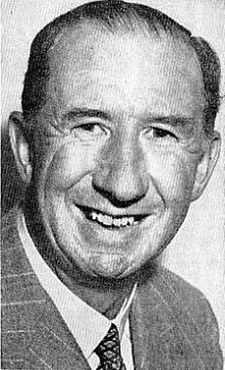Beyond the Black Stump
Book Details
| Title: | Beyond the Black Stump | ||||||||
| Author: |
| ||||||||
| Published: | 1956 | ||||||||
| Publisher: | William Heinemann Ltd. | ||||||||
| Tags: | adventure, Australia, fiction | ||||||||
| Description: | The story concerns a young American geologist, Stanton Laird, working in the Australian outback in the field of oil exploration. Although he is in a very remote location - beyond the black stump - in a region called "the Lunatic" in Western Australia, he is part of a crew that has a well-appointed mobile facility. He is befriended by a local farming family, the Regans, and develops a relationship with their daughter Mollie. The Regans run an enormously profitable station, but their domestic lifestyle is, to say the least, unconventional, with the two Regan brothers at one time having Mollie's mother move from one to the other without bothering to get a divorce. The family is large, and even larger when counting the half-caste children produced by both fathers, and the children are taught by the Judge, an English exile and alcoholic, who gives the children an excellent education and keeps the finances of the station properly accounted for.--Wikipedia. [Suggest a different description.] |
||||||||
| Downloads: | 317 | ||||||||
| Pages: | 286  |
Author Bio for Norway, Nevil Shute

Shute's novels are written in a simple, highly readable style, with clearly delineated plot lines. Where there is a romantic element, sex is referred to only obliquely. Many of the stories are introduced by a narrator who is not a character in the story. The most common theme in Shute's novels is the dignity of work, spanning all classes, whether an Eastern European bar "hostess" (Ruined City) or brilliant boffin (No Highway).
Another recurrent theme is the bridging of social barriers such as class (Lonely Road and Landfall), race (The Chequer Board) or religion (Round the Bend). The Australian novels are individual hymns to that country, with subtle disparagement of the mores of the USA (Beyond the Black Stump) and overt antipathy towards the post-World War II socialist government of Shute's native Britain (The Far Country and In the Wet).
Shute lived a comfortable middle-class English life. His heroes tended to be middle class: solicitors, doctors, accountants, bank managers, engineers. Usually, like himself, they had enjoyed the privilege of university, not then within the purview of the lower classes. However (as in Trustee from the Toolroom), Shute valued the honest artisan and his social integrity and contributions to society more than the contributions of the upper classes.
Aviation and engineering provide the backdrop for many of Shute's novels. He identified how engineering, science and design could improve human life and more than once used the apparently anonymous epigram "It has been said an engineer is a man who can do for five shillings what any fool can do for a pound...."
Several of Shute's novels explore the boundary between accepted science and rational belief on the one hand, and mystical or paranormal possibilities, including reincarnation, on the other hand. Shute does this by including elements that can be considered fantasy or science fiction in novels are classified as mainstream. These are based in elements that would be considered religious, mystical, or psychic phenomena in the British vernacular when they were written. These include: Buddhist astrology and folk prophecy in "The Chequer Board"; the effective use of a ouija board in "No Highway"; a messiah figure in "Round the Bend"; and past and future lives with a psychic connection, near-future science fiction, and Aboriginal psychic powers in "In the Wet."--Wikipedia.
Available Formats
No book directory. Upload has not been completed.This book is in the public domain in Canada, and is made available to you DRM-free. You may do whatever you like with this book, but mostly we hope you will read it.
Here at FadedPage and our companion site Distributed Proofreaders Canada, we pride ourselves on producing the best ebooks you can find. Please tell us about any errors you have found in this book, or in the information on this page about this book.